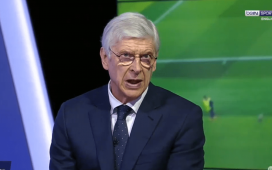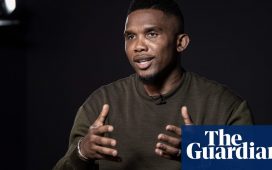At training on Wednesday Billy Vunipola gathered his England teammates around him and delivered seven words they absolutely did not want to hear. “Lads, this could be our last session,” the No 8 told his perspiring comrades. When one or two started smiling, assuming he was having a laugh, he instantly put them straight. “Look, I’m being serious. If we don’t turn up, we are going home.”
Win or lose in the quarter-final against Australia, it was a revealing snapshot. Vunipola is generally a positive, upbeat figure, not often prone to finger-jabbing lectures. Matches such as this, though, can make or break the reputations of players, coaches and referees, and Vunipola wanted everyone to go in with their eyes open. “You don’t want to live in fairyland. We have talked about just taking it head-on and making sure we know what the consequences are. If not, you get to Sunday and it’s done. That’s when the excuses come up.”
It does not require a masters degree in psychology to trace the origins of this mindset back to 2015 when England’s World Cup dreams became a waking nightmare. Vunipola, who was injured for the Australia pool fixture that hammered home the final nail, has shared in enough subsequent trophy glory with Saracens to know which of the two emotions he prefers. “We know what success feels like which, as a team, we didn’t before 2015,” he says, keenly aware it is 12 years since England last won a World Cup knockout fixture of any description.
This weekend, though, is set to provide the answer to a fundamental question: to what extent has England’s underachievement at recent World Cups – and their occasionally scratchy form in Japan – simply been down to personnel rather than culture, coaching or the assorted other variables people always focus on?
In particular, think about the combined talents and physical presence of Billy, his brother Mako and Manu Tuilagi and then ask yourself how many times, before this weekend, the trio have all featured in the same England starting XV? The answer – with a nod of thanks to the statistician Russ Petty – is twice. On both occasions, in the 2019 Six Nations, England flattened Ireland in Dublin and France at Twickenham in their two most impressive tournament displays of the Jones era.

Bearing in mind the three share a total of 140 caps between them, it begs a follow-up: how far could they propel England if they ever stay fit enough to play half a dozen consecutive games together? It is one of the big reasons why England’s coaches, the Wallabies result notwithstanding, think this team still have plenty more to come. Strange though it may sound, the Vunipolas are utterly convinced they perform better when both of them are on the field. “It definitely is a thing,” Billy, 26, says. “I enjoy having him around; he’s like my shield. That’s what big brothers do. I thoroughly enjoy playing with him and I’m happy to see him back in the team.”
There are more practical reasons involved, too. With Mako, now 28, around, Billy feels under slightly less pressure to take on the world each and every time he carries the ball. “Subconsciously it’s not something we think about but having my brother there gives me a little more time. He takes away tension because he is as much of a [carrying] threat. It takes a lot of pressure off me. He’s the older brother … anything that comes towards the Vunipolas he usually takes the brunt of it. I’m always in the back just kicking back as younger brothers do.”
This fraternal bond is slightly more complicated off the field; like so many brothers, the Vunipolas tend to show their love for each other in different ways. “We have a funny relationship. Deep down we really love each other but he’d never say anything to me. I always say it to him but he gets embarrassed and runs away. There is definitely that love and respect but we don’t have to hang around and tell each other every day or every other minute how much we care for each other. It’s just there. We don’t hang out, unless his little boy is here. My nephew is what brings us together.”
Playing against one another also used to be problematic in the days before Billy switched from Wasps to join Mako at Saracens in 2013. “It was easier in the garden at home because we were brothers. On the pitch it was hard. I didn’t want to tackle him, it felt really weird. I’d rather be with him than against him. Unless we are playing video games – then I beat him all the time.”
The countdown clock, though, is ticking in real life. By the time the next World Cup comes around in France in 2023 both Vunipolas will be over 30. Tuilagi, 28, has already cast public doubt over whether his body will carry him through another World Cup campaign. If the three Pacific powerhouses are going to achieve something extra special together, the time to seize the day has arrived.
A similar now-or-never imperative helped propel England’s 2003 squad to their World Cup success. Not winning was completely unthinkable. Study the list of this century’s Webb Ellis Cup winners and all have had uncompromising back-row triumvirates who simply refused to take no for an answer. Richard Hill, Neil Back and Lawrence Dallaglio in 2003, Schalk Burger, Juan Smith and Danie Rossouw in 2007, Jerome Kaino, Richie McCaw and Kieran Read in 2011 and 2015. Maybe it is unrealistic to expect the more youthful Tom Curry and Sam Underhill to help Vunipola scale similar heights in Japan but, if England are truly aiming high, there is little other option.
It explains why Vunipola openly concedes the management have told him he needs to up his game and be more direct when carrying, rather than sidestepping before contact. “At the moment I’m not doing any tough carries. That’s what we talked about, doing the hard yards, which I probably haven’t been doing. I went from using no footwork to using a lot and now I think I need to go back. Hopefully that’ll create space for me to use footwork later.”
If England end up faltering at this World Cup a lack of collective desire will not be the reason why.














